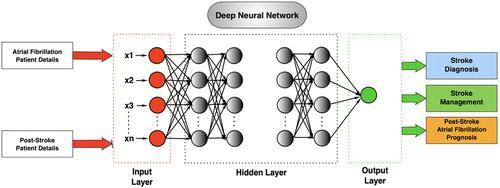当前位置:
X-MOL 学术
›
Ann. N. Y. Acad. Sci.
›
论文详情
Our official English website, www.x-mol.net, welcomes your
feedback! (Note: you will need to create a separate account there.)
The role of artificial intelligence in optimizing management of atrial fibrillation in acute ischemic stroke
Annals of the New York Academy of Sciences ( IF 4.1 ) Pub Date : 2024-10-08 , DOI: 10.1111/nyas.15231 Bill Goh, Sonu M. M. Bhaskar
Annals of the New York Academy of Sciences ( IF 4.1 ) Pub Date : 2024-10-08 , DOI: 10.1111/nyas.15231 Bill Goh, Sonu M. M. Bhaskar

|
Atrial fibrillation (AF) is a severe condition associated with high morbidity and mortality, including an increased risk of stroke and poor outcomes poststroke. Our understanding of the prognosis in AF remains poor. Machine learning (ML) has been applied to the diagnosis, management, and prognosis of AF in the context of stroke but remains suboptimal for clinical use. This article endeavors to provide a comprehensive overview of current ML applications to AF patients at risk of stroke, as well as poststroke patients without AF. Strategies to develop effective ML involve the validation of a variety of ML algorithms across internal and external datasets as well as exploring their predictive powers in hypothetical and realistic settings. Recent literature of this rapidly evolving field has displayed much promise. However, further testing and innovation of medical artificial intelligence are required before its imminent introduction to ensure complete patient trust within the community. Prioritizing this research is imperative for advancing the optimization of ongoing care for AF patients, as well as the management of stroke patients with AF.
中文翻译:

人工智能在优化急性缺血性卒中心房颤动管理中的作用
心房颤动 (AF) 是一种与高发病率和高死亡率相关的严重疾病,包括中风风险增加和中风后不良预后。我们对 AF 预后的理解仍然很差。机器学习 (ML) 已应用于中风情况下 AF 的诊断、管理和预后,但对于临床使用来说仍然不是最佳选择。本文试图为有中风风险的 AF 患者以及没有 AF 的中风后患者提供当前 ML 应用的全面概述。开发有效 ML 的策略涉及跨内部和外部数据集验证各种 ML 算法,以及探索它们在假设和现实环境中的预测能力。这个快速发展的领域的最新文献显示出很大的前景。然而,在即将推出医疗人工智能之前,还需要对医疗人工智能进行进一步的测试和创新,以确保社区内患者完全信任。优先考虑这项研究对于推进 AF 患者持续护理的优化以及 AF 中风患者的管理至关重要。
更新日期:2024-10-08
中文翻译:

人工智能在优化急性缺血性卒中心房颤动管理中的作用
心房颤动 (AF) 是一种与高发病率和高死亡率相关的严重疾病,包括中风风险增加和中风后不良预后。我们对 AF 预后的理解仍然很差。机器学习 (ML) 已应用于中风情况下 AF 的诊断、管理和预后,但对于临床使用来说仍然不是最佳选择。本文试图为有中风风险的 AF 患者以及没有 AF 的中风后患者提供当前 ML 应用的全面概述。开发有效 ML 的策略涉及跨内部和外部数据集验证各种 ML 算法,以及探索它们在假设和现实环境中的预测能力。这个快速发展的领域的最新文献显示出很大的前景。然而,在即将推出医疗人工智能之前,还需要对医疗人工智能进行进一步的测试和创新,以确保社区内患者完全信任。优先考虑这项研究对于推进 AF 患者持续护理的优化以及 AF 中风患者的管理至关重要。


















































 京公网安备 11010802027423号
京公网安备 11010802027423号